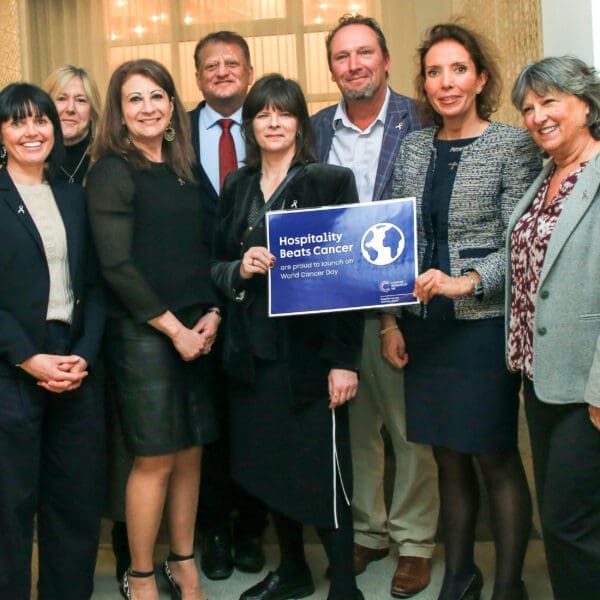 EHL Hospitality Business School entitled their research day “Navigating the Covid Storm”, where the future of the hospitality industry was discussed by EHL faculty members. The insights reflect the diversity of subjects investigated by EHL researchers and the challenges and opportunities that lie ahead for the hospitality industry. “Welcome back to the new abnormal, how may I help you?”
EHL Hospitality Business School entitled their research day “Navigating the Covid Storm”, where the future of the hospitality industry was discussed by EHL faculty members. The insights reflect the diversity of subjects investigated by EHL researchers and the challenges and opportunities that lie ahead for the hospitality industry. “Welcome back to the new abnormal, how may I help you?”
Small, family-owned firms fared well
Sifting through the winners and losers of the pandemic, Dr. Cédric Poretti, Assistant Professor of accounting, found that when a family owns 20% or more of a company, that company tends to do better. Why? A family tends to look after “its” firm better, i.e. they keep the management team on a shorter leash. A family also can make decisions faster, its portfolio is less diverse making the success or failure of the company all the more critical, and the family has a much deeper “socio-emotional attachment” to its business, according to Poretti.
In the Swiss context, families tend to have a long-term, intergenerational vision that is not “100% rational”, i.e. solely based on profit and loss. In particular, small firms with a CEO/Chairman who is a member of the family outperformed but Poretti hypothesized that another factor could be at play: liquidity. Hedge funds and private equity firms do not tend to invest in small, family-owned firms and instead turn their sights to large, public enterprises. As a result, they are shielded from indiscriminate sell-offs by big investors. In short, firms owned and operated by a family endured milder liquidity swings and have emerged as relative winners during the pandemic.
Wine knows no crisis
For Dr. Philippe Masset, Associate Professor of finance, wine has been a clear winner. “Wine consumption was up during the semi-lockdown period throughout Europe” and there is room for “measured optimism” for Swiss wines as consumers, backed by local initiatives, intend to increase their purchases of domestic wines, according to his interviews with wine connoisseurs. In particular, independent wine producers were the biggest winners while large brands were able to stem losses due to promotions and aggressive marketing campaigns. For Masset, the winning formula combines “online sales plus reasonable prices plus direct clients equals the ideal situation to cope with Covid-19 ”.
Nevertheless, “structural problems”, which were in play before the crisis, have exacerbated the woes of the micro-producers and intermediaries who sell their production to wholesalers. He called on better leadership in terms of industry governance, state support and equipping vintners with the tools (e.g., marketing, administration, online sales, specific training programs) that have become staples in the 21st century. In closing, Masset painted a fairly optimistic picture of the Swiss wine industry stating that Covid had “exacerbated pre-existing structural problems but did not cause a short-term crisis” in the industry.
46% of Swiss SMEs say yes to remote working
“Remote working is here to stay,” exclaimed Dr. Sowon Kim, Associate Professor of organizational behavior, during her presentation on effective online networking. Based on her findings, 46% of Swiss SMEs intend to prolong remote working, citing increased task efficiency among other factors. However, there are myriad challenges in working from home where, as Kim says, “you’re basically interacting with a talking head”.
However, with the right technology (good Wifi for starters) and by fostering prosocial behavior (active listening, sharing, etc.), while leveraging social networks (LinkedIn) Swiss small- and medium-sized enterprises can improve their online networking. More specifically, she underscored the importance of “pre-building relations” via LinkedIn or elsewhere, which means doing your homework before networking with strangers online.
Swiss hospitality: -40% (2020 vs. 2019)
“Is the cure worse than the disease?”, asked Dr. Isabelle Blengini, Associate Professor of economics, at the start of her presentation. It is a question that many have probably asked themselves at some point in the last two years. As government intervention has chipped away at the labor participation rate, production has dropped and inflation has risen – with grave consequences particularly in the United States and Western Europe.
According to Blengini’s research, covid-related uncertainty has been three times as high as economic anxiety due to Brexit. “If I don’t know what is going to happen to GDP then I don’t know what is going to happen in hospitality”, she said. The bane of markets, “uncertainty can, however, spark governmental intervention, which sends a strong signal to practitioners in the hospitality industry”, observed Blengini whose models attempt to correlate government intervention (both in the public health realm and economic aid) to economic performance and occupancy rates across the hotel industry.
“While it is still too early to say definitively, Switzerland – for many reasons — chose to limit its intervention and, while GDP has recovered fairly well, one thing we can agree on is that hospitality was the industry that was hit the hardest by Covid”, she added. Indeed, according to her research the value that hospitality added to the Swiss economy in 2020 plummeted 40% compared with 2019, which is on par with figures in France and the U.K.
However, the sharp rebound seen in the U.K. and the U.S. has yet to materialize in France or Switzerland. In fact, the Swiss hospitality industry’s value-added dropped 13% in 2021 compared to 2020. Her research attempts to draw various correlations but as she stated: “One of the results I can confirm is that in countries with a large percentage of its population that is vaccinated there are positive and strong effects on economic performance,” Blengini summarized. “What I have observed from data up to the third quarter of 2021 is that the hospitality sector in Switzerland is not recovering yet”, she concluded.
How will hospitality emerge from the pandemic?
EHL’s panel discussion debated how Covid-19 has helped reinvent the hospitality industry and how it has affected hotels at a more micro level. “Welcome back to the new abnormal”, was how Dr. Laura Zizka, an Assistant Professor who teaches crisis communications among other subjects, greeted the audience. Whereas Associate Professor of management, Dr. Stefano Borzillo addressed how management structures are shifting: “Covid is a launchpad of reflection for hoteliers to reconsider their decision-making processes, flatten the vertical hierarchy and enhance cross-department cooperation” as seen in “semi-structural improvement teams that meet regularly to share best practices to enhance the guest experience,” he said.
New business models are emerging, says Dr. Alessandro Inversini, Associate Professor of marketing, as “hybridization will rule in the near future” and that “hotels are no longer a place where you sleep” but that the “hotel of the future needs something more, they need to turn outward to their cities”. For Inversini, “This is actually happening, some hotels especially in cities have actually become the heart of their communities, offering a new customer experience that is relevant to the community.”
This assertion was echoed by Dr. Augusto Hasman, Associate Professor of finance, “one of the unexpected benefits of the pandemic has been flexibility and our ability to adapt our business to the local market and community”. For Dr. Cindy Heo, Associate Professor specialized in revenue management, the issue could be internal: “We need to open the gates to new employees from outside hospitality”. For Professor Inversini the labor shortage “is going to be crucial in the months and years to come”. Trust-building has been critical in hotels’ efforts to bring guest back as the pandemic wanes, says Dr. Valentina Clergue, Assistant Professor of marketing. Indeed, she pointed to partnerships between hotel brands and hospital groups or household sanitation products as novel approaches to allaying guests Covid-related fears.
The final rapid-fire predictions from each panel member pointed at: flexibility, hybridization, ignoring assumptions, the importance of trust and brands, the need to talk about crises and the talent shortage.

Will the new normal be greener?
For Dr. Giovanni-Battista Derchi, an Associate Professor of finance at EHL, “there is mixed evidence regarding an empirical relationship between investment in corporate sustainability and financial performance,” and which types of investment. While there has been a chorus of calls for a greener ‘new normal’ to emerge from the pandemic, according to his research, investments in environmental efforts and product safety are well-received by the financial markets compared with investments in the workforce and local communities. “Optimal investments are value relevant but overinvestment is penalized by capital markets,” he added.
Consumers’ old habits die hard
Finally, Dr. Carlos Martin-Rios, Associate Professor of management, discussed food waste and the pandemic. “EHL is a living laboratory”, and the results of his study give pause for thought. Some 42% of his sample of EHL students hadn’t heard about food waste, don’t care (39%) and wouldn’t change (38%) their behavior. “I have reasonable doubts about whether Covid has changed anything for this group”, he noted, “but conversely, close to 62% of EHL students surveyed would likely change their behavior if they were provided with more information on the importance of this topic”. Here is where, with more action-research, EHL can rebuild better and stronger after the pandemic.
As hospitality emerges, with its lot of winners and losers, from the wreckage of the pandemic, a new industry is emerging where challenges and opportunities await the surviving players.



















